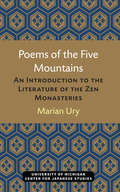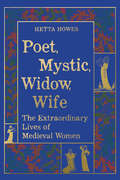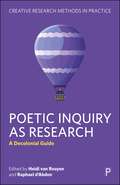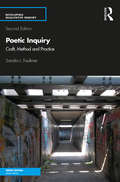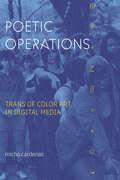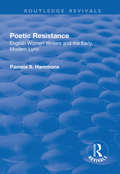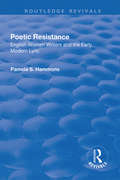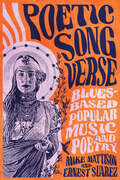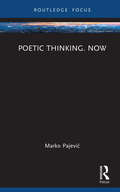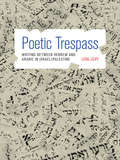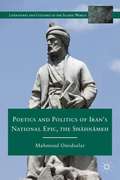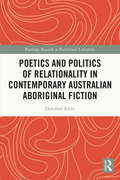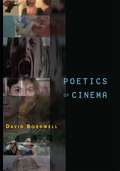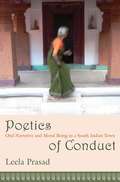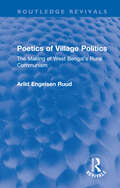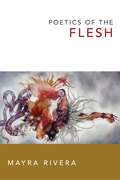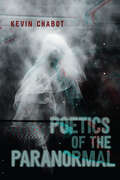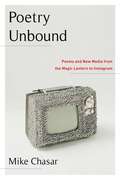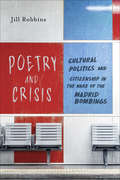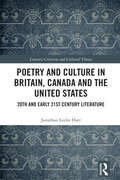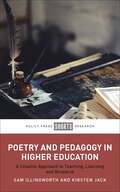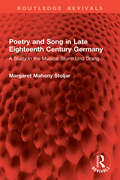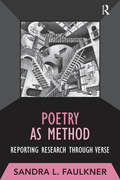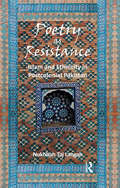- Table View
- List View
Poems of the Five Mountains: An Introduction to the Literature of the Zen Monasteries (Michigan Monograph Series in Japanese Studies #10)
by Marian UryThis second, revised edition of a pioneering volume, long out of print, presents translations of Japanese Zen poems on sorrow, old age, homesickness, the seasons, the ravages of time, solitude, the scenic beauty of the landscape of Japan, and monastic life. Composed by Japanese Zen monks who lived from the last quarter of the thirteenth century to the middle of the fifteenth century, these poems represent a portion of the best of the writing called in Japanese gozan bungaku, “literature of the five mountains.” “Five mountains” or “five monasteries” refers to the system by which the Zen monasteries were hierarchically ordered and governed. For the monks in the monasteries, poetry functioned as a means not only of expressing religious convictions and personal feelings but also of communicating with others in a civilized and courteous fashion. Effacing barriers of time and space, the practice of Chinese poetry also made it possible for Japanese authors to feel at one with their Chinese counterparts and the great poets of antiquity. This was a time when Zen as an institution was being established and contact with the Chinese mainland becoming increasingly frequent—ten of the sixteen poets represented here visited China. Marian Ury has provided a short but substantial introduction to the Chinese poetry of Japanese gozan monasteries, and her translations of the poetry are masterful. Poems of the Five Mountains is an important work for anyone interested in Japanese literature, Chinese literature, East Asian Religion, and Zen Buddhism.
Poet, Mystic, Widow, Wife: The Extraordinary Lives of Medieval Women
by Hetta HowesAn invaluable reassessment of what we think we know about the daily lives of women in medieval Europe. Poet, Mystic, Widow, Wife charts the lives and times of four medieval women writers—Marie de France, a poet; Julian of Norwich, a mystic and anchoress; Christine de Pizan, a widow and court writer; and Margery Kempe, a no-good wife—who all bucked convention and forged their own paths. Largely forgotten by modern readers, these women have an astonishing amount to teach us about love, marriage, motherhood, friendship, and earning a living. Reading the words of these four writers, Hetta Howes engagingly reveals how everyday women lived, survived, and thrived in medieval times. Who did they marry and why? Did they ever have extramarital affairs? Could they earn money and become self-sufficient? Could they be leaders? What did they think about death—and what about life and their place in it? Poet, Mystic, Widow, Wife paints a vibrant portrait of these women, their world, and the ways they speak to us today.
Poetic Inquiry as Research: A Decolonial Guide (Creative Research Methods in Practice)
by Heidi van Rooyen and Raphael d’AbdonPoetic inquiry is an arts-based approach integrating the humanities and sciences to enhance the quality of social science research and its dissemination. This insightful guide sheds light on the transformative power of poetic inquiry in academic research. Blending poetry with scholarly work, it offers practical advice on crafting research poems, distinguishing them from literary poems and determining when and how to incorporate them into your studies. The book: - helps researchers to explore and express their research creatively; - emphasises diverse and decolonial viewpoints and paths to knowledge; - features methods, case studies, prompts and exercises from the Global South and North. Perfect for researchers eager to explore new dimensions of expression, this guide enriches all aspects of the research process.
Poetic Inquiry: Craft, Method and Practice (Developing Qualitative Inquiry)
by Sandra L. FaulknerPoetic Inquiry: Craft, Method and Practice examines the use of poetry as a form of qualitative research, representation, and method used by researchers, practitioners, and students from across the social sciences and humanities. It serves as a practical manual for using poetry in qualitative research through the presentation of varied examples of Poetic Inquiry. It provides how-to exercises for developing and using poetry as a qualitative research method. The book begins by mapping out what doing and critiquing Poetic Inquiry entails via a discussion of the power of poetry, poets’, and researchers’ goals for the use of poetry, and the kinds of projects that are best suited for Poetic Inquiry. It also provides descriptions of the process and craft of creating Poetic Inquiry, and suggestions for how to evaluate and engage with Poetic Inquiry. The book further contends with questions of method, process, and craft from poets’ and researchers’ perspectives. It shows the implications for the aesthetic and epistemic concerns in poetry, and furthers transdisciplinary dialogues between the humanities and social sciences. Faulkner shows the importance of considering the form and function of Poetic Inquiry in qualitative research through discussions of poetry as research method, poetry as qualitative analysis and representation, and Poetic Inquiry as a powerful research tool.
Poetic Operations: Trans of Color Art in Digital Media (ASTERISK)
by micha cárdenasIn Poetic Operations artist and theorist micha cárdenas considers contemporary digital media, artwork, and poetry in order to articulate trans of color strategies for safety and survival. Drawing on decolonial theory, women of color feminism, media theory, and queer of color critique, cárdenas develops a method she calls algorithmic analysis. Understanding algorithms as sets of instructions designed to perform specific tasks (like a recipe), she breaks them into their component parts, called operations. By focusing on these operations, cárdenas identifies how trans and gender-non-conforming artists, especially artists of color, rewrite algorithms to counter violence and develop strategies for liberation. In her analyses of Giuseppe Campuzano's holographic art, Esdras Parra's and Kai Cheng Thom's poetry, Mattie Brice's digital games, Janelle Monáe's music videos, and her own artistic practice, cárdenas shows how algorithmic analysis provides new modes of understanding the complex processes of identity and oppression and the intersection of gender, sexuality, and race.
Poetic Resistance: English Women Writers and the Early Modern Lyric (Routledge Revivals)
by Pamela S HammonsThis title was first published in 2002: Pamela Hammons' study contributes to the booming field of early modern women writers by contextualizing and analyzing a unique configuration of underexamined women's texts. By examining how 17th-century English women's composition of lyrics intersects significantly with the social experiences of the writers, the book challenges assumptions that have limited the study of early modern women's writing and reveals the power of lyrics in women's reconceiving or changing of their positions in society. Here Hammons reconsiders how generic conventions were employed as a means by which women writers could borrow from socially sanctioned poetic traditions to express potentially subversive views of their social roles as mothers, religious leaders, widows, and poets. Although the narrative concentrates on early modern lyrics, it also treats contemporary plays, epics, prose polemics, conversion narratives, religious treatises, newsbook articles, and Biblical texts in building its arguments. The study engages extensively with issues concerning manuscript and social texts in the context of print culture through the close examination of a variety of textual practices. It provides a thorough yet subtle grounding in recent feminist criticism, the social history of the family, and the history of authorship practices.
Poetic Resistance: English Women Writers and the Early Modern Lyric (Women And Gender In The Early Modern World Ser.)
by Pamela HammonsThis title was first published in 2002: Pamela Hammons' study contributes to the booming field of early modern women writers by contextualizing and analyzing a unique configuration of underexamined women's texts. By examining how 17th-century English women's composition of lyrics intersects significantly with the social experiences of the writers, the book challenges assumptions that have limited the study of early modern women's writing and reveals the power of lyrics in women's reconceiving or changing of their positions in society. Here Hammons reconsiders how generic conventions were employed as a means by which women writers could borrow from socially sanctioned poetic traditions to express potentially subversive views of their social roles as mothers, religious leaders, widows, and poets. Although the narrative concentrates on early modern lyrics, it also treats contemporary plays, epics, prose polemics, conversion narratives, religious treatises, newsbook articles, and Biblical texts in building its arguments. The study engages extensively with issues concerning manuscript and social texts in the context of print culture through the close examination of a variety of textual practices.
Poetic Song Verse: Blues-Based Popular Music and Poetry
by Ernest Suarez Mike MattisonPoetic Song Verse: Blues-Based Popular Music and Poetry invokes and critiques the relationship between blues-based popular music and poetry in the twentieth and twenty-first centuries. The volume is anchored in music from the 1960s, when a concentration of artists transformed modes of popular music from entertainment to art-that-entertains. Musician Mike Mattison and literary historian Ernest Suarez synthesize a wide range of writing about blues and rock—biographies, histories, articles in popular magazines, personal reminiscences, and a selective smattering of academic studies—to examine the development of a relatively new literary genre dubbed by the authors as “poetic song verse.” They argue that poetic song verse was nurtured in the fifties and early sixties by the blues and in Beat coffee houses, and matured in the mid-to-late sixties in the art of Bob Dylan, the Beatles, the Rolling Stones, the Doors, Jimi Hendrix, Joni Mitchell, Leonard Cohen, Gil Scott-Heron, Van Morrison, and others who used voice, instrumentation, arrangement, and production to foreground semantically textured, often allusive, and evocative lyrics that resembled and engaged poetry. Among the questions asked in Poetic Song Verse are: What, exactly, is this new genre? What were its origins? And how has it developed? How do we study and assess it? To answer these questions, Mattison and Suarez engage in an extended discussion of the roots of the relationship between blues-based music and poetry and address how it developed into a distinct literary genre. Unlocking the combination of richly textured lyrics wedded to recorded music reveals a dynamism at the core of poetic song verse that can often go unrealized in what often has been considered merely popular entertainment. This volume balances historical details and analysis of particular songs with accessibility to create a lively, intelligent, and cohesive narrative that provides scholars, teachers, students, music influencers, and devoted fans with an overarching perspective on the poetic power and blues roots of this new literary genre.
Poetic Thinking. Now (Routledge Focus on Literature)
by Marko PajevićThis book presents my concept of poetic thinking in the context of debates around the anthropological question, that is ‘what is being human?’, building on ‘thinking language’ and dialogical thinking, developing a poetological anthropology. It evokes political and social issues to demonstrate why poetics is of general relevance for our times. The chapters relate these questions to insights of quantum physics and neurosciences and discuss aspects of contemporary technology, media and medicine, employing notions such as atmospheres, immanent transcendence, silence and presence from contemporary thinkers. Poetic thinking considers the world in its togetherness, offering an alternative to the opposition of subject and object. It demonstrates the transformative power in the interaction of the form of language and the form of life. Poetic thinking takes place when a subject constitutes itself in creative and dialogical language, transforming its ways of feeling and thinking, in short, its way of perceiving the world.
Poetic Trespass
by Lital LevyA Palestinian-Israeli poet declares a new state whose language, "Homelandic," is a combination of Arabic and Hebrew. A Jewish-Israeli author imagines a "language plague" that infects young Hebrew speakers with old world accents, and sends the narrator in search of his Arabic heritage. In Poetic Trespass, Lital Levy brings together such startling visions to offer the first in-depth study of the relationship between Hebrew and Arabic in the literature and culture of Israel/Palestine. More than that, she presents a captivating portrait of the literary imagination's power to transgress political boundaries and transform ideas about language and belonging. Blending history and literature, Poetic Trespass traces the interwoven life of Arabic and Hebrew in Israel/Palestine from the turn of the twentieth century to the present, exposing the two languages' intimate entanglements in contemporary works of prose, poetry, film, and visual art by both Palestinian and Jewish citizens of Israel. In a context where intense political and social pressures work to identify Jews with Hebrew and Palestinians with Arabic, Levy finds writers who have boldly crossed over this divide to create literature in the language of their "other," as well as writers who bring the two languages into dialogue to rewrite them from within. Exploring such acts of poetic trespass, Levy introduces new readings of canonical and lesser-known authors, including Emile Habiby, Hayyim Nahman Bialik, Anton Shammas, Saul Tchernichowsky, Samir Naqqash, Ronit Matalon, Salman Masalha, A. B. Yehoshua, and Almog Behar. By revealing uncommon visions of what it means to write in Arabic and Hebrew, Poetic Trespass will change the way we understand literature and culture in the shadow of the Israeli-Palestinian conflict.Some images inside the book are unavailable due to digital copyright restrictions.
Poetics and Politics of Iran’s National Epic, the Shāhnāmeh
by Mahmoud OmidsalarThis book considers some of the Western interpretations of The Shahnameh - Iran's national epic, and argues that these interpretations are not only methodologically flawed, but are also more revealing of Western concerns and anxieties about Iran than they are about the Shahnameh.
Poetics and Politics of Relationality in Contemporary Australian Aboriginal Fiction (Routledge Research in Postcolonial Literatures)
by Dorothee KleinPoetics and Politics of Relationality in Contemporary Australian Aboriginal Fiction is the first sustained study of the formal particularities of works by Bruce Pascoe, Kim Scott, Tara June Winch, and Alexis Wright. Drawing on a rich theoretical framework that includes approaches to relationality by Aboriginal thinkers, Edouard Glissant, and Jean-Luc Nancy, and recent work in New Formalism and narrative theory, it illustrates how they use a broad range of narrative techniques to mediate, negotiate, and temporarily create networks of relations that interlink all elements of the universe. Through this focus on relationality, Aboriginal writing gains both local and global significance. Locally, these narratives assert Indigenous sovereignty by staging an unbroken interrelatedness of people and their Land. Globally, they intervene into current discourses about humanity’s relationship with the natural environment, urging readers to acknowledge our interrelatedness with and dependence on the land that sustains us.
Poetics of Cinema
by David BordwellBringing together twenty-five years of work on what he has called the "historical poetics of cinema," David Bordwell presents an extended analysis of a key question for film studies: how are films made, in particular historical contexts, in order to achieve certain effects? For Bordwell, films are made things, existing within historical contexts, and aim to create determinate effects. Beginning with this central thesis, Bordwell works out a full understanding of how films channel and recast cultural influences for their cinematic purposes. With more than five hundred film stills, Poetics of Cinema is a must-have for any student of cinema.
Poetics of Cinema
by David BordwellBringing together twenty-five years of work on what he has called the "historical poetics of cinema," David Bordwell presents an extended analysis of a key question for film studies: how are films made, in particular historical contexts, in order to achieve certain effects? For Bordwell, films are made things, existing within historical contexts, and aim to create determinate effects. Beginning with this central thesis, Bordwell works out a full understanding of how films channel and recast cultural influences for their cinematic purposes. With more than five hundred film stills, Poetics of Cinema is a must-have for any student of cinema.
Poetics of Conduct: Oral Narrative and Moral Being in a South Indian Town
by Leela PrasadLeela Prasad's riveting book presents everyday stories on subjects such as deities, ascetics, cats, and cooking along with stylized, publicly delivered ethical discourse, and shows that the study of oral narrative and performance is essential to ethical inquiry. Prasad builds on more than a decade of her ethnographic research in the famous Hindu pilgrimage town of Sringeri, Karnataka, in southwestern India, where for centuries a vibrant local culture has flourished alongside a tradition of monastic authority. Oral narratives and the seeing-and-doing orientations that are part of everyday life compel the question: How do individuals imagine the normative, and negotiate and express it, when normative sources are many and diverging? Moral persuasiveness, Prasad suggests, is intimately tied to the aesthetics of narration, and imagination plays a vital role in shaping how people create, refute, or relate to "text," "moral authority," and "community." Lived understandings of ethics keep notions of text and practice in flux and raise questions about the constitution of "theory" itself. Prasad's innovative use of ethnography, poetics, philosophy of language, and narrative and performance studies demonstrates how the moral self, with a capacity for artistic expression, is dynamic and gendered, with a historical presence and a political agency.
Poetics of Village Politics: The Making of West Bengal's Rural Communism (Routledge Revivals)
by Arild Engelsen RuudOriginally published in 2003, this volume studies village politics and the changes brought about in rural society through political developments. It focuses on the social, political and cultural circumstances of communist mobilization in rural West Bengal. It analyses the emergence of rural communism in the local context of changes in the position of women, in caste practices, in economic conditions and in new efforts to create ‘development’. It investigates how this cultural change interacts with the mechanisms and tools of village politics, and using anthropological methods and oral history as tools, allows for a detailed and intimate ethnographic description of village politics and its changes.
Poetics of the Flesh
by Mayra RiveraIn Poetics of the Flesh Mayra Rivera offers poetic reflections on how we understand our carnal relationship to the world, at once spiritual, organic, and social. She connects conversations about corporeality in theology, political theory, and continental philosophy to show the relationship between the ways ancient Christian thinkers and modern Western philosophers conceive of the "body" and "flesh." Her readings of the biblical writings of John and Paul as well as the work of Tertullian illustrate how Christian ideas of flesh influenced the works of Maurice Merleau-Ponty and Michel Foucault, and inform her readings of Judith Butler, Frantz Fanon, and others. Rivera also furthers developments in new materialism by exploring the intersections among bodies, material elements, social arrangements, and discourses through body and flesh. By painting a complex picture of bodies, and by developing an account of how the social materializes in flesh, Rivera provides a new way to understand gender and race.
Poetics of the Paranormal
by Kevin ChabotThe appearance of ghosts in art and popular culture has transformed throughout history. From the undead corpse of the medieval tradition to the transparent forms of photographic film, to the infrared and thermal images that now populate reality television, the paranormal has literally changed shape over the centuries.In Poetics of the Paranormal Kevin Chabot articulates the idea of spectrality, demonstrating how the paranormal is far from a stable, metaphysical category: it is a dynamic and historically contingent discourse, the contours of which shift over time. Specific media, Chabot argues, present the ghost in distinct ways that emphasize the ghostly qualities of the medium and, conversely, the technological qualities of the ghost. Through detailed analyses of nineteenth-century spirit photography, horror films, ghost-hunting reality television, and the viral internet phenomenon Slender Man, Chabot shows how the paranormal both shapes and is shaped by media.Exploring key historical shifts in contemporary media while providing a rich and novel theoretical framework, Poetics of the Paranormal addresses with renewed rigour the relationships between media, perception, temporality, and the elusive concept of the evidential.
Poetry Unbound: Poems and New Media from the Magic Lantern to Instagram
by Mike ChasarIt’s become commonplace in contemporary culture for critics to proclaim the death of poetry. Poetry, they say, is no longer relevant to the modern world, mortally wounded by the emergence of new media technologies. In Poetry Unbound, Mike Chasar rebuts claims that poetry has become a marginal art form, exploring how it has played a vibrant and culturally significant role by adapting to and shaping new media technologies in complex, unexpected, and powerful ways.Beginning with the magic lantern and continuing through the dominance of the internet, Chasar follows poetry’s travels off the page into new media formats, including silent film, sound film, and television. Mass and nonprint media have not stolen poetry’s audience, he contends, but have instead given people even more ways to experience poetry. Examining the use of canonical as well as religious and popular verse forms in a variety of genres, Chasar also traces how poetry has helped negotiate and legitimize the cultural status of emergent media. Ranging from Citizen Kane to Leave It to Beaver to best-selling Instapoet Rupi Kaur, this book reveals poetry’s ability to find new audiences and meanings in media forms with which it has often been thought to be incompatible. Illuminating poetry’s surprising multimedia history, Poetry Unbound offers a new paradigm for understanding poetry’s still evolving place in American culture.
Poetry and Crisis: Cultural Politics and Citizenship in the Wake of the Madrid Bombings (Toronto Iberic)
by Jill RobbinsOn March 11, 2004, Islamist terrorists carried out a massive bombing on Madrid’s largely working-class commuter trains, leaving 191 people dead and more than 1,500 others wounded. This event, known in Spain as 11-M, was the second of three highly visible jihadist attacks on the West between 2001 and 2005, and the first in Europe, occurring just days before the national elections in Spain. Arguing that 11-M marked a critical turning point in Spanish society, this book reveals how poetry played a unique role and reflected a new political and cultural sensibility defined by informal and non-hierarchical networks of communication and memorialization. After the attacks, poems circulated in public spaces in unexpected ways, creating links and relationships that were binding: they were inscribed on banners and monuments; musicalized in anthems, protest songs, and hip-hop music; reproduced on manifestos and blogs; sent by email and text; scribbled on scraps of paper and posted on walls; performed publicly; and painted as graffiti. These forms of expression also resonated strongly with Spanish poets who had already been exploring the possibilities of ethical engagement and aesthetic creation. Poetry and Crisis explores how this essentially poetic sensibility emerged from tragedy, laying the groundwork for similar kinds of affective and grassroots mobilization that continue to grow in Europe today.
Poetry and Culture in Britain, Canada and the United States: 20th and Early 21st Century Literature (Literary Criticism and Cultural Theory)
by Jonathan Locke HartThis book is about poetry and the poetic in the cultures and literatures of Britain, Canada and the United States. Close reading is the primary method. The figures discussed in the book were born from 1911 to the post-war years after 1945. The volume proceeds from Marshall McLuhan as a poet through Douglas LePan, Ted Hughes, Leonard Cohen, Margaret Atwood, Thomas King and Forrest Gander to Hannah Lowe, Russell Leong, Marilyn Chin, Fred Wah (interpoetics, poetry and culture in Chinese diasporic poetry), Louis Riel, Pauline Johnson, Naomi McIlwraith (Indigenous and Métis poetry), Gaspar Pérez de Villagrá, Anne Bradstreet, Phillis Wheatley, Langston Hughes, Joan Kane, Russell Leong, Marilyn Chin and Forrest Gander (the multiple makings of poetry of North America). Here is a poetry of the North Atlantic world, a transatlantic poetics then and now. The book reads poetry and the poetic in terms of media, aesthetics, drama, criticism, music, interpoetics, diaspora, culture, diversity, and African, Asian and Indigenous poets.
Poetry and Pedagogy in Higher Education: A Creative Approach to Teaching, Learning and Research
by Sam Illingworth Kirsten JackThis book invites us to consider the profound impact that poetry can have in shaping personal and professional development in a higher education setting. Suitable for educators, learners, and practitioners, it offers a transformative learning approach in using poetry for teaching, assessment, research, and reflection. The book includes diverse examples, case studies, and practical exercises, demonstrating poetry's application in personal and professional development in a higher education setting. Each chapter guides readers through these processes, empowering them to integrate poetry into their own teaching and learning practices in a way that is creative, inclusive, and impactful.
Poetry and Song in Late Eighteenth Century Germany: A Study in the Musical Sturm Und Drang (Routledge Revivals)
by Margaret Mahony StoljarThe German Lied in the period preceding Mozart is less well-known than that of the florescence under Schubert, Schumann and Wolf. But in Poetry and Song in Late Eighteenth Century Germany (originally published in 1985) Margaret Stoljar shows that the songs composed by C.P.E. Bach and his contemporaries have an interest and allure of their own. She concentrates her analysis on the interplay of poets and musicians, the use made by composers of the work of such distinguished poets as Klopstock, and the specific contribution that music was able to make to the reception of the poetry.As much a work of social history as of musicology, Poetry and Song in Late Eighteenth Century Germany casts a fascinating light on the leisure of the period and place, as well as on the development of taste and sensibility that prepared the way for Young Werther. The book is illustrated with examples of music.
Poetry as Method: Reporting Research Through Verse (Developing Qualitative Inquiry #6)
by Sandra L FaulknerThis book takes an interdisciplinary approach to using and creating poetry for conducting and reporting social research. It includes examples of poetry, interviews of poets, and practical exercises that will enhance the discussion of poetry writing as a method. When used as a teaching guide this book will encourage students to consider the importance of form and function in poetry for qualitative methods. It also answers the question of how to teach the creation and evaluation of poetry, it combats the perception that poetry is too difficult or mysterious to use as research and that only poets should be concerned with poetic craft.
Poetry as Resistance: Islam and Ethnicity in Postcolonial Pakistan
by Nukhbah Taj LangahFocusing on the culturally and historically rich Siraiki-speaking region, often tagged as ‘South Punjab’, this book discusses the ways in which Siraiki creative writers have transformed into political activists, resisting the self-imposed domination of the Punjabi–Mohajir ruling elite. Influenced by Sufi poets, their poetry takes the shape of both protest and dialogue. This book reflects upon the politics of identity and the political complications which are a result of colonisation and later, neo-colonisation of Pakistan. It challenges the philosophy of Pakistan — a state created for Muslims — which is now taking the shape of religious fanaticism, while disregarding ethnic and linguistic issues such as that of Siraiki.
